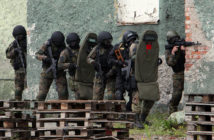North African governments must confront the rise in extremist movements and criminality before the security crisis is irreversible, Tunisian and Mediterranean experts say.
By Monia Ghanmi for Magharebia in Tunisia
![[AFP/Mahmud Turkia]Tunisian Defence Minister Abdelkarim Zbidi said November 6th in Tunis that extremist groups put the entire region at risk.](http://magharebia.com/cocoon/awi/images/2012/11/09/121109Feature1Photo1.jpg)
[AFP/Mahmud Turkia]Tunisian Defence Minister Abdelkarim Zbidi said November 6th in Tunis that extremist groups put the entire region at risk.
Islamist extremist movements endanger the security and stability of the entire Mediterranean basin, Tunisian Defence Minister Abdelkarim Zbidi warned this week.
“Countries in North Africa are experiencing poverty, marginalisation, exclusion, lack of development and the absence of institutions, an environment where organised crime is thriving and radical Islamic movements are spreading,” Zbidi told the Tunisian Institute of National Defence on Tuesday (November 6th).
He pointed out that the Mediterranean region “is also witnessing the proliferation of the arms and drug trades… and an increase in illegal immigration”.
“The Afro-Mediterranean region is considered a sensitive area in the world due to a lack of economic integration and limited real co-operation between its countries,” Zbidi said.
The combination of these challenges could “threaten the security and stability of the entire Mediterranean basin”, the defence minister added.
A recent conference organised by the Tunis-based Centre for Mediterranean and international Studies (CEMI) reached similar conclusions.
Held under the theme “Political Changes and the Impact on Security in the Mediterranean Region”, the October 30-31 event discussed how the rise of extreme Islamist movements is a growing danger to North African and Mediterranean countries.
Reactionary and extremist movements have found fertile ground in these countries on the pretext of protecting the Islamic religion, said Hardy Ostry, the representative of the Konrad Adenauer Foundation, which co-organised the event.
“These hard-line parties, especially in Tunisia, Libya and Egypt, want to impose their own security laws, parallel to the security institutions generally accepted in modern states,” Ostry said.
“This intention represents a major threat to stability in the Mediterranean region as a whole because it establishes a base for the law of extremism and terrorism,” the analyst added.
Moreover, the objectives of any revolution cannot be achieved while violence is growing and the security situation is deteriorating, analyst Khadija Vinene noted.
Salafist violence has grown well beyond the capacity of the Tunisian government to control it, she said, pointing to the September14th assault on the US Embassy in Tunis.
Such is the present dilemma, conference attendee Sorour Mhadhbi, a student from Tunis, said, since “imposing security and stability in public life is primarily the responsibility of the government”.
“The government is required to be firm, not complacent, with those militants,” Mhadhbi said.
But so long as religious hard-liners continue to commit crimes, “one cannot talk about security in the country”, forum speaker Ahmed Haj Salem, 42 from El Kef, said.
Related Articles
Tunisia solicits foreign help to counter al-Qaeda threat
2012-06-22
UN official warns of Libya arms proliferation
2011-12-01
US report commends Maghreb for countering extremism
2010-11-28
Tunisia may recognise Libya rebels
2011-06-20
US pledges support for Maghreb battle against al-Qaeda
2010-06-02
“Salafists and stable security together is a difficult, if not impossible, equation to solve,” he added.
For Dr Alaya Allani, a professor of contemporary history at Manouba University and specialist in political Islam, the “risk has reached a degree that can no longer be ignored”.
The Tunisian government has begun to realise that its security vulnerability and salafist control of parts of the territory are unacceptable, Allani explained.
In this context, the Tunisian presidency earlier this month extended the state of emergency until the end of January 2013.
.






